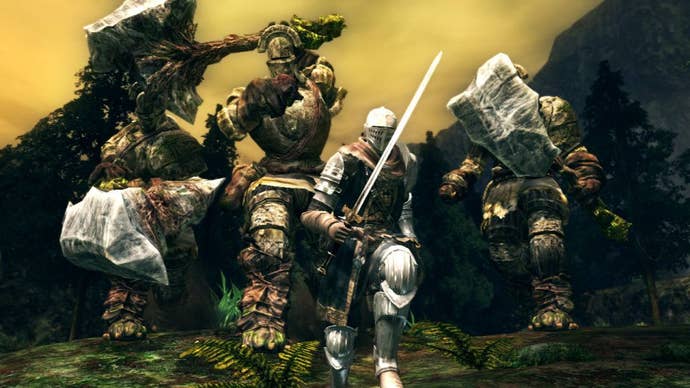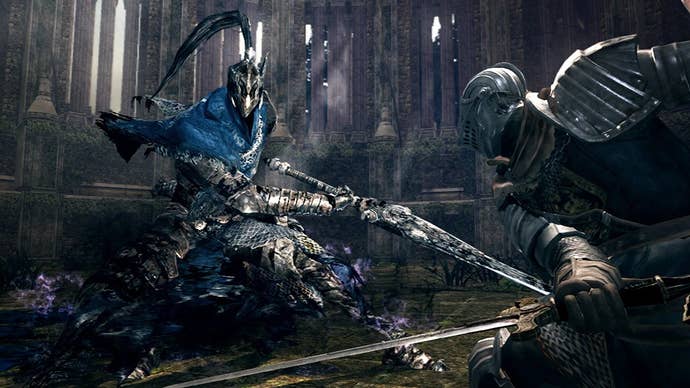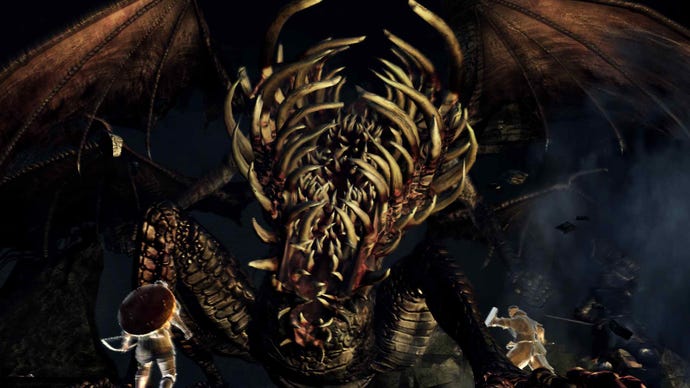Covenant of Humanity: Those Who Never Left Dark Souls
In this multi-part series, we talk to the community still entrenched within the Age of Fire.
This article first appeared on USgamer, a partner publication of VG247. Some content, such as this article, has been migrated to VG247 for posterity after USgamer's closure - but it has not been edited or further vetted by the VG247 team.
Warning: Bad language is present as are spoilers. If either are offensive, you probably should not read any further.
"Why did I stay? It has something to do with the feel of this community. It is, at the same time, an elitist, welcoming, light-hearted mutant stitched together by the infinite replayability of a game that never forgives."
I pause.
"I'm stealing that quote."
The name for the PC version says it all, really. Dark Souls: Prepare to Die. In a time where games don't so much hold your hand as they do smother you in positive feedback, Dark Souls stands as an anomaly. Beloved for its savagery and lauded for its fair-but-tough-as-Battletoads design, From Software's action role-playing game provides no quarters, no allowance for mistakes. Where victory in another game is all but predestined, Dark Souls will contest every second you spend alive; a nightmarish Horatius at the bridge. To reach the end of the bleak, sprawling pilgrimage that the game puts you on, you'd need more than time. You'd need perfect execution, a fierce sense of obstinacy and the willingness to die again and again.
"It's not a 'f**k you' difficult even though it may seem that way to the uninitiated," Redditor retrogameaudio says. "I think the Mega Man series makes for a more appropriate comparison. If you haven't played many action platformers before and you've never played Mega Man, you're probably going to think it's insanely difficult. You will die many, many times before learning how to navigate all the pitfalls, how to counter enemy behavior and learning all the bosses' move sets and weaknesses. But, amongst fans of the NES, NO ONE considers the Mega Man games to be anywhere near the most difficult games out there. In fact, once you know the games pretty well, they even start to feel pretty easy."
He adds, "Dark Souls is the exact same way. You will die a lot in the process of learning enemy behavior, but unlike the NES games that were insanely hard because they felt like an unrefined mess, you'll find that the challenge is heavily refined and allows for a lot of progress. Because it allows you to learn and improve your skills to an impressive level, veterans will tell newcomers that your knowledge and skill are more important than your gear."
Like a marathon reading of the Lords of the Ring anthology, one playthrough is usually sufficient for most. But after the ending credits rolled, not everyone left. Some remained. And to this covenant of humanity, Dark Souls became more than just a complicated dalliance, a reason to impatiently wait for the next iteration. For them, it became a culture, a dueling ground, an emblem of superiority, a world of their own.
-*-
"Skeleton?"
".. I have no idea what that meant."
The first answer on my Reddit thread is a question.
The original poster replies, admitting equal ignorance. For him, it's simply a running gag, a moment of startling levity when juxtaposed against the overall tone of the game. Others then join the conversation, of course.
Someone chimes in: "Players are able to leave short, pre-written messages on the ground which then show up in other people's game worlds. The messages can then be voted on, but certain conditions had to be met for the person reading it to see if the score the message has is positive or negative. Every positive vote grants the person who wrote it one humanity. Back when the game came out nobody really knew how to easily gain humanity. That is, until everyone started catching on to how messages worked. It was then decided that "Skeleton?" was a code word for people on /v/ (and other communities) for bros who needed humanity. If you saw the message, you upvoted it no matter what."
The legitimacy of the claim ("The idea that you get Humanity from it is a rumor that's been going on since the game was released, and persists to this day, but the majority of players that have learned a lot about the game's mechanics seem to believe it isn't true.") is questioned. A warning about beanpoles. Then, another advises, in a rather enigmatic fashion, to 'lure [the skeleton] out.'
Dark Souls has always been more than the sum of its parts. A minimalist plot and an environment that allows you to rush high-level content even from the beginning make for a game steeped in nuances. And it shows in the society that sprouted around it. There is a lexicon of terms unique to the community as opposed to the game, a library of videos depicting incredible speedruns and clever pranks. PvP, originally designed, perhaps, to be a periodic danger, has been turned into a competitive pursuit. In spite of the limited tools, the Dark Souls community, undying soldiers weaned on violence, made themselves a home.
"I think that's what keeps me coming back. It's like, yeah the game is hard, glitchy, and confusing, but being able to fall back on the community makes it really worthwhile as you achieve more goals and challenges you set for yourself, whether they be your own or adopted from others, such as the Onebro. Dark Souls being as confusing and deep as it is encourages you to go the community, and the community encourages you to return to Dark Souls." A Reddit user, now deleted, tells me.

They continue on, describing how the game serves as crucible for friendship. "Because we've all suffered through Capra Demon, O&S, and the motherfucking Bed of f**king Chaos, there's an inherent sympathy between members of the community in an 'I've been there' way, but without condescension. There will be varying degrees of luck in each player's first playthrough that might allow them to avoid the problems almost all other players run into, but it's impossible not to suffer at some point. And in that suffering is solidarity."
It isn't simply a case of fellowship either. Much of Dark Souls' story is told in tatters, bits and pieces offered up with no rhythm. Seen from the outside, it may appear nominal. But to those willing to investigate, there is depth and a kind of artless grandeur. "In a world where everything has gone Hollow and even the butterflies shoot lasers, you can't expect the world to explain itself. The experience of appreciating the world within Dark Souls is active, not passive, and in that way each fragment of information, clue to the past, or insight into the present is that much more powerful. With the help of the community, one can draw connections between what one has found and what others have found, as well as toss around theories."
"To be a bit dramatic, the story and world of Dark Souls is more similar to a novel or poem than it is a video game in that regard."
-*-
While most Covenants in Dark Souls, NPC-led factions to which players can align themselves, supply some sort of direct benefit to those who join their cause, there is one that holds its followers with nothing but a hopeless, desperate promise.
"Unless you have a Pyromancy Flame, it's probably not worth the grind to unlock an arguably useless shortcut, " KanaKuroko, who has never played a game more than once prior to Dark Souls, explains. "But what we do have is a fanatical devotion to the Covenant leader, Our Fair Lady."
The Fair Lady spoken of is the monstrous, half-spider sister of the Chaos Witch Quelaag. Weakened and immobile, the blind saint of the Chaos Covenant can be found in Blighttown, ringed by her stillborn eggs. She is, in a way, a living testament to the cruelty of Dark Souls. The only reason she exists within her current state is because she elected compassion over heartlessness. When faced with the plight of those in Blighttown, the Fair Lady chose to take pustulence tormenting the denizens into herself. Her sacrifice freed them but damned her in exchange.
"Chaos is probably the only true 'open' covenant because of the end goal. It's not for weapons, recognition or even really power. The best spell you acquire for simply joining. It's Humanity to give to Our Fair Lady, to ease her suffering. It's a wonderfully subtle thing, where you have players from all different kinds of builds and outlook coming together for a singular purpose. It's also really hard for me, personally, to care about a lot of NPC's in games. But she just has a devastating and heart breaking story, that only gets worse by your hand when you find her," KanaKuroko says. " Even in-game, in certain areas you can be invaded by a 'Darkwraith Kirk' NPC. When you defeated him three times, you find his corpse.... in the room with Our Fair Lady. He had either infiltrated the Darkwraiths to invade other undead for their humanity, or had felt the same crushing guilt and despair the rest of us did. His final act was offering the humanity he had stolen to her, in a desperate bid to ease her suffering, even a little bit."
Humanity is the only coin capable of purchasing her respite. Even then, however, it is only a partial solution. Because of her design, because of the mechanics of the game, there is no happy ending for the Fair Lady. The only happiness, questionable as it may be, that her devotees can offer her is enough cognizance to understand her children are dead.
-*-
The Fair Lady of Blighttown is not the only NPC the Dark Souls community is enamored of. Solaire, an unfathomably good-natured Warrior of the Sunlight and one of the first characters encountered, is another fan favorite.
"Virtually every other friendly NPC in the game that has dialogue is willing to help you because you helped them first or because they're a merchant doing business. Solaire, however, owes you absolutely nothing. You just show up out of the blue while he's busy admiring the sun, and in your first meeting, he offers to give you some assistance with future boss fights. Not because you rescued him from a prison, nor because you removed an obstacle that was in his path. He just offers it because he's nice." Redditor Zaranell says.
"A year and a half after its release, people are still finding things to discuss and coming up with new theories. Some questions remain unanswered, and open to a lot of speculation: was Manus the furtive Pygmy briefly mentioned in the intro video? Who was Gwyn's firstborn? What exactly does Nito's title 'first of the dead' mean? Is Petrus of Thoruland simply a coward, or does he have a secret objective under orders from his church? Who are Priscilla's parents? The list goes on. As you may imagine, for some players, a large part of the reason we're looking forward to the sequel is not only so that we might gain some answers, but also so that we can start exploring new mysteries."
-*-
Lore aside, many stay for what Dark Souls does best:
Combat.
Hicut92, yet another Redditor, explains: "The most interesting thing about Dark Souls PvP, compared to the PvP found in other games, is that there are so many unwritten rules surrounding etiquette, equipment, spells, gestures etc. It's one of the game's biggest strengths and weaknesses. For example, it's considered proper duel etiquette to bow to your opponent before engaging. Nowhere in the manual or tutorial does it say you have to do this, but almost the entire community abides by this 'rule'. However, it's so easy to exploit this. You invade, opponent bows, you ignore this and head straight for the kill. It's what makes everything about Dark Souls so unpredictable and unique to this series."

Everything in PvP is fair game, a byproduct of Dark Souls' parameters, perhaps. Invasions themselves follow a simple mechanic. If you have certain items or meet particular conditions, you'll be able to invade someone else's game as a spectral representation of yourself. If a player is online and is in human form, they can be attacked. No ifs, no buts. Though the game provides warning of an impending assault, there is no real way to keep others out. Much like in any other aspect of the game, Dark Souls is unforgiving here too. (Disconnecting from the Internet is always possible but is often viewed as cravenly and uncouth behavior)
Naturally, such a setting is quite conductive to griefing. While many take a straightforward stance to invasions -a call to arms, a duel, and the winner returns with a harvest of souls -, others approach it from a more sadistic perspective.
"It has been said that it is one thing to kill a man, but another matter entirely to take away his dignity. Griefing in Dark Souls comes in the typical murdering variety, but some griefers go far beyond their duty to make the invadee's (host's) life a living hell, " Redditor substandardgaussian begins. "Some griefers will show up in a world and then simply hide as long as possible. The host can always challenge the area's boss to get rid of the invader, but if they are quite far away, expect beads of sweat and high blood pressure as the host inches warily throughout the entire level, with nary an invader in sight... They also can't leave the area/almost always can't visit a bonfire during an invasion, so this doubly screws them."
He links a video showcasing usage of the Chameleon spell, an enhancement that permits its user to turn into a piece of scenery. Interestingly, it's also the same spell used in a video called The Barrel Game which comprises of three players luring an invader into a fatal game of three card Monte.
"My favorite 'grief' involves a somewhat lengthy explanation, but I admire its deviousness so I'll relay it anyway. It is possible to force a certain area of the game to become a 'Dark' version of itself. If you do this, you are permanently able to be invaded in that area regardless of whether you've defeated the boss. It is, therefore, a popular pvp zone. When you die in this area now, though, you are always returned to a specific bonfire near the beginning, regardless of where you have rested. Thing is, this bonfire will probably be deactivated because its keeper (who is required for it to be lit) will have turned hostile. In order for you to progress, you must then physically run to another bonfire location. The grief comes when an invader, knowing this caveat about death in this area, goes out of his way to turn a lever which causes a MAJOR shortcut in the level to disappear. If they leave the shortcut in the "OFF" position and then kill you, you are left at a deactivated bonfire with no choice but to either leave the area backwards (a lengthy run), OR go the horribly long way around that involves a VERY irritating tightrope walking section, all so that you can return to a part of the game you were just at a moment ago. TADA!"
Friendlier examples exist too and deceptive messages are a staple for the less bloodthirsty Tricksters of Dark Souls. Ledge with a deadly fall? 'Try jumping.' NPC with an impressive decolletage within the next few minutes? 'Amazing chest ahead.' It goes on. One player, known as still_sic_of_it, guiltily confesses to their favorite prank. "My favorite is at the end of that long hallway at the top of Sen's Fortress where there's just a single Balder Knight. There really seems like there should be something at the end of that hall, but there's just nothing. So, sometimes... maybe I put an 'Illusory wall ahead' message there."
Tomorrow, we'll cover more tricks, competitive PvP, Dark Souls roleplaying (yes, that's a thing), and more.




